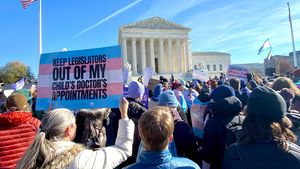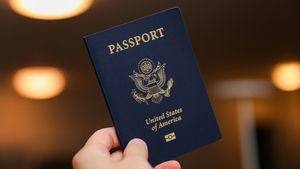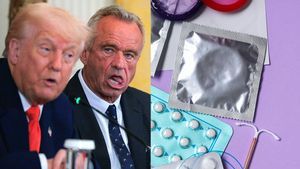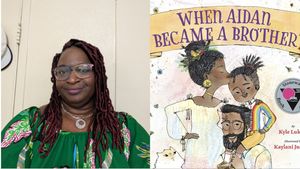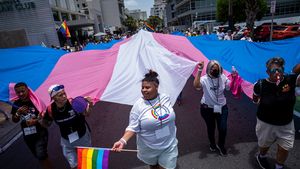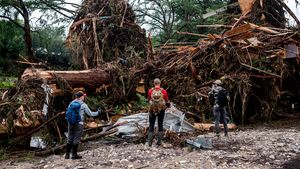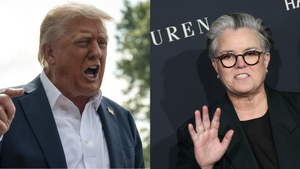Photography by Michael Muller. Styling by Grant Woolhead.
"Mr. B. is coming," the producer said, but Jussie Smollett had no idea what that meant.
On Empire, he'd recorded with everyone from Rita Ora and Patti LaBelle to Alicia Keys, an embarrassment of musical riches so great that it almost became easier to make a short list of R&B and rap artists who hadn't been on the show -- yet.
But on this day in Swizz Beatz's New York studio, they were working on something a little different: a Pepsi commercial jingle for his character, Jamal Lyon. Smollett wasn't expecting anyone else.
"You know," Swizz said. "Mr. B. -- Mr. Belafonte."
And that was when Smollett lost his chill. Sure, he'd gushed over LaBelle. And every day at work he was going head-to-head with formidable, far more experienced actors. But Harry Belafonte was in another league, and Smollett was unprepared.
"I felt like I was meeting a pharaoh or a king," says Smollett, who told Mr. Belafonte -- as he insists on calling him, with full respect accorded -- that he had long been an idol above all others. That was why Swizz had secretly invited Belafonte to join them. "He's a great man," Smollett adds. "And he has kept his voice as an activist without losing his voice as an artist."
There was just one, very embarrassing problem. "I didn't know I was going to meet him -- so I was wearing a raggedy-assed tee. I put on the only thing I had in my bag, which was a sweater." There was crisp, elegant Mr. Belafonte -- who at age 89 still glows serenely -- and Smollett was literally a hot mess. "It was so out of I Love Lucy. But he was still so sweet, and in the middle of me telling him how much he meant to me, he cut me off and said, 'When do we get to break bread?' "
SLIDESHOW: Jussie Smollett, Unplugged
Empire co-creator Lee Daniels was also at the studio that day. "I remember Harry being so complimentary of Jussie," he says, "and it was the first time I saw Jussie starstruck. It was funny to see him squirm."
After Belafonte left, Daniels teased Smollett. "I said, 'Fucker, you weren't even that nervous when you auditioned for me. What the fuck?' " Daniels chuckles loudly at the memory, and then falls serious again. "But that's because Harry was a leader at the forefront of the civil rights movement -- and that's who Jussie is, too."
Smollett, 32, is having a hell of a year. It's the day before the Golden Globes, where Empire, which was also the highest-rated scripted broadcast program in the 2014-15 season, is nominated for best TV drama. This morning he was shooting in Chicago, then on a private plane with his castmates to Los Angeles. Tomorrow he walks the red carpet and jets back into the cold Midwestern winter. In between, he has a photo shoot and an interview.
5 Things We Learned From Jussie Smollett
"I don't take this career for granted," he says, "and I have been given a very special platform through Empire to speak on a weekly basis about love and truth and acceptance."
Indeed, on Empire, Fox's prime-time musical soap opera about a tumultuous, morally ambiguous family and the record company they built and struggle to hold on to, Smollett's middle-child character, Jamal, is often the only one it's easy to root for.
In blistering flashbacks, we relive Jamal's angry father, Lucious (Terrence Howard), discovering his son tottering in high heels, only to unceremoniously carry the child downstairs and deposit him in a trash can (a scene drawn from Daniels's own life). Lucious condemns, threatens, belittles, and then -- sometimes -- agrees to disagree with the fact that Jamal is gay. That Jamal's mother (Cookie, played by Taraji P. Henson) fully supports her son's sexuality is undercut slightly by how everyone in the family uses, well, everything against each other eventually.
"I was so afraid to tell the true story of what it's like to walk in the shoes of a black man that's gay in the music business, where it's really shunned," Daniels says. "Jussie has brought to life that character. He's so fucking smart -- much smarter than Jamal -- and I think he's a really good role model, whereas Jamal is more of an artist, and selfish, in a beautiful way."
Smollett is trying his damnedest to do his part. (His actual Twitter bio: "I am here to help save the world.") "I have so much love inside that it pains me sometimes," he says. "You end up finding yourself all-consumed by the issues of the world, and that's something I don't want to change about myself. So until the love of my life shows up, until I find my boo, I'm just going to be out, up in this piece, a lone ranger."

We're sitting behind the soundboard in Valentine Recording Studios on Laurel Canyon -- not the Joni Mitchell end high in the Hollywood Hills, but an unassuming storefront on the flat boulevard cutting north through the Valley.
Giants from Bing Crosby to the Beach Boys cut classic albums here. It's a time capsule that's gone untouched for nearly 35 years and has only recently been reopened for business. A vending machine squeezed into a hallway urges you to "be sociable, have a Pepsi," for just 65 cents a bottle. Delighted, Smollett asks whether it was brought in as a prop. (It wasn't, just another life-imitates-Empire moment of verisimilitude.)
He settles into a low-slung chair, tucking one leg under himself, and takes stock of how he got here. "It's been 367 days that I've been known," he says, counting back to Empire's premiere on January 7, 2015. The date is impossible to forget because on the brink of Smollett going from relative obscurity to being seen by millions of people every week, his father died.
"He passed away that morning -- so, yeah, it sucked. But I had no choice but to be grounded," Smollett says. "I was so rooted in family and in love when it all happened that if I was going to change, it wasn't going to happen now."
Joel Smollett, Sr., was a Russian-Polish Jew ("he'd kill you if you called him white, though," Jussie says), a hardworking guy who supported the family as a cable splicer at ITT in New York and then PacBell. "Like him, I'm probably over-protective," Smollett says. "He was a worrywart." And when he's now faced with the bizarre new realities of his life -- like paparazzi following him -- it's his dad he wants to call. "He'd be like, 'Man, I'm going to go and get a security guard outfit and follow you.' And I'm like, 'You're 5 foot 7. Chill out, you're not going to do anything.' "
Smollett's eyes fill with tears. "My father was far from perfect, but he was OK with changing, with becoming a better man -- so I had my dad before he left us. I didn't have him necessarily all through my childhood, the way I would have liked, but I had him in those last years, and for that I'm forever grateful."
It was Smollett's mother, Janet, who largely managed him and his five siblings -- he's the third oldest -- including a series of cross-country moves as the kids pursued acting careers. "My older sister Jazz called up NBC and said, 'I want to play Rudy [Huxtable]'s friend.' My mom said no. But she's a combination of Cookie Lyon and Fraulein Maria from The Sound of Music. We used to march around and imagine that we were the Von Trapp children -- we were only one off, cause there's seven of them. So while she was saying no, we were being trained."
His parents separated when he was 15, and Smollett struggled to find the next beat after Disney fare like Mighty Ducks and On Our Own, a short-lived ABC sitcom starring all six of the Smollett kids as the orphaned brood raised by their oldest brother in Mrs. Doubtfire-style drag. "I wasn't a child star," he insists. "I was just a working actor. And then I wasn't a cutesy kid anymore, but I also wasn't a leading man."
Plus, "Even when I got out of the business, my family was still in the business," he says. "I went to three different high schools in my senior year alone," including the L.A.-area Calabasas High School -- "it was called Cala-black-less," Smollett remembers -- and later Malibu High, also predominantly white. "I felt very, very out of place. Every day it was almost like, when you're putting your drawers on, you're putting on your armor."
He spent lunches at the library. "And I dreamed of this -- that I would be able to do all the things I wanted to do. How would I navigate a world where I was told I should probably be behind the camera because of being gay?"
In his last year, after winning the lead in a production of Damn Yankees, he lost it. "People were uncomfortable that I would be kissing this white girl," he says. "It was 2000. After that, I left the school, because why subject myself to that bullshit?"
Looking back, he finds an upside. "It made my balls drop," he says, with almost Terrence Howard-like braggadocio. "It grew some hair on my chest. It made me a man."
And there was one last creative refuge: "I knew that I wanted to do music. From the time I was 13 until now -- so almost 20 years -- I've been recording."
Six of his own songs have been used on Empire, though his album is currently on hold while he focuses on the show, where he's at least able to learn from its guests. "Who knows more about publishing than Mariah Carey? She schooled me. She truly is one of the most brilliant people that I've ever talked to."

Before they were allowed to act or sing, Smollett and his siblings had to truly understand their most important role -- as activists. "That work started when I was a child," he says.
His younger sister, Jurnee -- also still an actor -- was inspired by the story of Hydeia Broadbent, the famous 1990s "AIDS baby." She began working with Los Angeles-area advocates, including Black AIDS Institute founder Phill Wilson, who became Jussie's mentor. ("One day I will do a movie about him," pledges Smollett, who was honored by Wilson's organization last year and now sits on its board.)
Smollett ended up a staffer at Artists for a New South Africa. He spent five years with a brutal two-hour commute on a bus, coordinating donations for auctions that raised money for the group's AIDS work. He kept making music, traveled to Europe when he could afford it, and eventually had scored enough support for his songs that he could quit to make an album -- and go back to auditioning, too.
He booked guest roles on The Mindy Project and Revenge and a few small films, then heard about Empire and found his way to Daniels, who cast Smollett in a role based largely on Daniels's own youth. "It's easy for me to write about my experience," Daniels says. "It's therapeutic even. And it's easy for me to hide behind my desk -- Jussie has to perform it. I'm not as brave as he is."
Unlike Jamal, Smollett says, "I have not been handed a silver spoon. I have not been handed a thing in my life, except love. With that said, it's been difficult for me for many of the same reasons as Jamal, but I have had to work really, really hard -- not just for acceptance, but also for my bread and butter. And that's why I don't take any of it for granted."
Not taking it for granted, staying grounded because of his family, also means being willing to walk away -- and at one point in the past year he thought he might. As the heady success of Empire rolled forward last spring, picking up viewers at an unprecedented rate, there were two things on Smollett's mind.
One: When and how would he officially, publicly be ready to talk about his sexual orientation?
And two: How would he use this new, huge platform to raise his voice against injustice, to say unequivocally that black lives matter?
There was basically full support to say or not say whatever he wanted about his orientation. He was playing a gay character on an acclaimed show created by an outspoken gay man. But there was also Taraji P. Henson's perspective, per Smollett: "She said, 'Who gives a fuck? I don't tell these motherfuckers that I'm straight. Why the fuck do you have to tell them that you're gay?' That was so O.G., and it just made me love her even more."
When it came to calling out violence against communities of color, however, there was suddenly serious pushback. "I was told by two executives, 'You know, maybe just wait. Just wait,' " Smollett says. He was planning to travel to Washington, D.C., speak on the steps of the Capitol as part of the March 2 Justice, and then help deliver a legislative package on police brutality to Congress.
"[The executives] were talking specifically about politics. My response was, 'But they're listening now.' And if millions of people are listening, you should say something worth hearing."
He paid his own way to the march. "People were telling me, 'Don't do it.' But I felt like, If I lose my career based on this, then I don't need that career." He shrugs, acknowledging a certain amount of rhetoric. "I know damn well that this is the career for me, but I don't know how to turn a blind eye."
He sits forward, emphatic. "You mean to tell me just because I make movies and TV and music that I can't talk about what's going on in the world I live in? Really? That's not fair. Forget that. Because I'm scared that maybe viewership is going to go down? Or my next single isn't going to do as well? Or I won't get a movie?" He rolls his eyes. "At some point, I was going to say what I believe anyway." (In the fall of 2015, Empire frequently referenced the Black Lives Matter movement and many of the key issues raised by its advocates. Daniels concurs: "Many people don't like that I'm blunt about it. I get in trouble a lot, but I don't care.")
Along the way, Smollett met DeRay Mckesson, one of the more visible advocates to emerge from the protests in Ferguson, Mo., after Michael Brown's death (and an honoree in last year's Out100). "Jussie has made a commitment both to understanding the issues and speaking about them," Mckesson says, diplomatically contrasting this to the experience of movement work with some well-intentioned but less-informed celebrities.
"We are having these conversations exploring and thinking through the details of a particular death or situation, and then what potential next steps can be. He truly cares, understands, and wants to use his platform to amplify this work and get us closer to solutions." And, Mckesson adds, "He's just a good person who's not afraid to say or tell the truth."
"There is so much work to be done," Smollett says. "Like, oh my God, we are fucked up. Next-level fucked up. And I don't know what the fuck we are going to do, but we got to do something, and we've got to do it fast. We've got to change the world, y'all."

Last March, Smollett was a guest on The Ellen DeGeneres Show. "I was like two months deep into this fame thing," he says. He wasn't going to say he was gay. He'd come out to his parents at 19. Jamal was on TV every week. He didn't need to tell the world.
"The second you say something, they want that to be your storyline forever," he says. "That narrative doesn't interest me at all."
Plus, "If people really looked," he says, they'd know he'd already played gay -- including in sex scenes that made Empire's own boundary-breaking scenes look tame -- in a 2012 Patrik-Ian Polk indie film, The Skinny. Five years before, a French magazine had flat-out asked if he was gay, and he'd said yes. He had a giant equal sign tattooed on one arm, which was on full display in Empire.
Instead, he sang a song from the show and told DeGeneres how he handled negative tweets about Jamal's coming out. The interview wrapped. They stood up and hugged, and he said, "I was ready to talk about it," had she asked. "She told me, 'You don't have to.' I will be forever grateful to Ellen for the kindness she showed me. And that made me want to talk about it."
So when the cameras were set up again in the green room, DeGeneres asked, and he answered. Sort of. "There's never been a closet that I've been in," he said. His sister Jurnee was there with him, and she posted an Instagram of the two of them jumping up triumphantly in the air in front of the Ellen logo. She tagged it: #Andtheworldkeepsspinning #proudsister.
"It was a much bigger deal for other people than it was for me," Smollett insists.
Now, a year and some change since Empire's launch, he's ready to get more specific. "I am a gay man with an extremely open heart," he says, easy and assured until he's asked to elaborate on what that means to him. "God, I've never had to talk about this, so I'm trying to find the words. If I had to label myself, I would label myself as a gay man. With that said, I believe that love is the only thing that matters, and I would hope that anybody would leave themselves open -- not to gender, but to love. I would hope that people would not close themselves off from what could be if, lo and behold, you meet somebody that just sweeps you off your feet, and you just can't do anything about it. If we truly believe that we are born this way, then why do we try to stifle the way we were born? If I fall in love down the road with a woman, I'm going to love that woman."
"I'm sure that those words will be misconstrued," he says, because if there's one thing he's learned this year, it's how easily that can happen. "But this is a conversation that deserves to be had, because we don't all understand each other. You're not going to tell me that loving someone is wrong. That does not mean that heterosexuality is not very real. It does not mean that bisexuality is not very real. It does not mean that homosexuality is not very real. They are all very real. But what I'm saying is, I am a gay man. I am a gay man. I am a gay man. I don't know how many times I have to say that."
There was one guy he dated this past year, a "wonderful person," he says. "It started off as, 'They don't understand anything about my life!' And then it turned into..." He switches from sweet appreciation to frustration. 'They don't understand anything about my life.' I have way too much love to give not to find my baby for life, but I don't think now is the time."
Meanwhile, back at Empire, the melodrama continues. Smollett teases that the surprising season 2 hookup between Jamal and Skye Summers, a songstress played by Alicia Keys, may not be the only time we'll see his character slide a little on the Kinsey scale. "We got a lot of shit for that, and I get it," he says, while pointing out he would have expected nothing but cheers from the queers if Jamal's brother Andre had experimented with a guy. "All of these children would be like, 'Yes! Andre's gay!' Jamal didn't have a problem with kissing Skye Summers -- the people around him had an issue with it. It's usually other people's issues, not our own."
Other people's issues -- like the limitations for an out gay actor. Daniels says, "I think Jussie is a prime example of how life in Hollywood is changing -- and that's what makes me so proud. He is redefining through Empire what a leading man can be."
The night before his co-star Henson will win the Golden Globe for best actress in a TV drama (handing out cookies in honor of her character's name while making her way to the stage to accept), Smollett is just looking forward to going home and spending time with his niece. "She doesn't give a damn about Empire," he says, fondly.
"When I was growing up," he adds, "I would ask my mother a question, and she'd be like, 'Now, you know the answer to that. Usually the simplest answer is the best one.' Usually the simplest answer is the right one."
"I absolutely, with everything in my heart, I swear to you, believe that at people's core, they want to be good -- and I will cry about it because I believe it so much," Smollett says. "I don't believe that we were created to hate. I believe that we were created only to love. Love is the root of the happiest of times and of wars. Love, or lack of love -- but love is the root of everything."
SLIDESHOW: Jussie Smollett, Unplugged





























